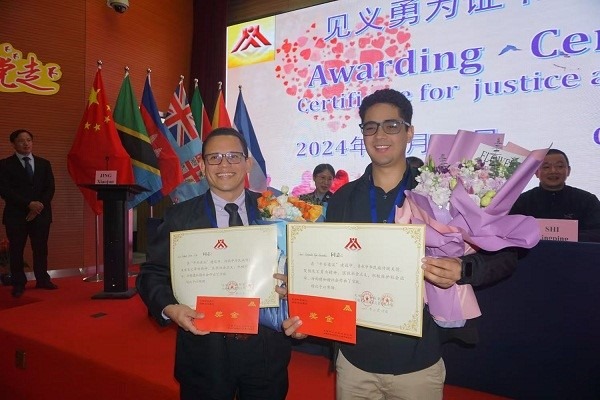Reinvestigation: Better lives in Xinjiang villages refute 'forced labor' allegations

BEIJING -- When Zhou Jin'an returned to the village he once worked in for years in southern Xinjiang Uygur autonomous region, he was warmly received by the villagers, who shook hands with him and invited him to their homes for a chat over tea.
Zhou used to be a member of the residential work team in that village. Such teams are groups of personnel, either from regional government departments or state-run enterprises, dispatched to poor rural areas to help boost local development.
Earlier this year, The Economist published an article claiming that work teams in Xinjiang villages sought to compel local Uygur farmers to seek alternative employment. However, such allegations, hyped by Western media in recent years, unravel when one observes the interactions between local farmers and Zhou and his colleagues.
"THEY HELPED EVERY HOUSEHOLD"
In early 2015, Zhou, who works for a state-run company, was dispatched to work in a village in Yutian, a county on the southern edge of the Taklamakan Desert and among the last counties in Xinjiang to eliminate absolute poverty in late 2020.
At that time, Zhou could not imagine he would work and live for over eight years in villages in Yutian. Almost all residents there are Uygur farmers, who traditionally earn a living by growing wheat, corn, and roses and raising sheep and poultry.
"We brought agricultural experts to guide the villagers in farming. We built vegetable greenhouses and a small processing plant for local produce, such as roses and cistanche, a Chinese herbal medicine. We would help all households that had difficulties. That was what we were there to do," said Zhou.
Zhou was part of an eight-member team working in a village of around 1,600 residents. One daily routine was visiting households so that he could get to know what assistance they needed.
Since many middle-aged and elderly villagers were not fluent in Mandarin, Zhou's Uygur colleagues would translate for him. Sometimes, younger members of the household would translate. Rayila Matturzi was one of them.
The 25-year-old, the eldest of four siblings, was a high school student when Zhou and his colleagues came to work in her village.
With her mother farming at home and her father doing construction work, Rayila's parents brought in a limited income, while her younger brother was diagnosed with epilepsy, a chronic disease that requires long-term treatment.
"The work team did so much for my family. They contacted a hospital for my younger brother, funded his treatment and my studies, and always came to see us with things like flour, meat, and the medicines my brother needed. And it was not just for my family. They helped every household in the village," said Rayila, now a senior student majoring in English at a university near Urumqi, Xinjiang's capital.
She was especially grateful to Zhou. "Every time Uncle Zhou came to my home, he would ask about my life and studies and encourage me. He would say, 'If you need any help, just tell me.' I really liked sharing my stories with him. All the villagers think he is a great man," she said.
To support Rayila's family, Zhou helped her mother secure a part-time job as a cleaner, providing an additional source of income. Earlier this year, through a friend's recommendation, Rayila's mother began working as a cook at her son's school, where the canteen staff are all from low-income households, as part of a program to support these families.
"My family is much better off now. All the villagers are better off now. Everything in the village has been improved -- the roads, the houses, the school, the health facilities," said Rayila. "Without the work team, there would not have been such great changes."
Tuersun Aibai, an associate professor at the School of Journalism and Communication at Xinjiang University, who has been studying social changes in southern Xinjiang, said that those work teams have been serving the local people and boosting the development of rural areas "with a pure intention and concrete achievements."
The recognition and support of local people of all ethnic groups testifies to that, he added.
"EVERYONE WANTS A BETTER LIFE"
Rayila was surprised by Western media allegations that work teams in Xinjiang villages forced "reluctant farmers to leave and do other forms of work."
"That is ridiculous. We earn money on our own and spend it for ourselves. Everyone wants a better life," she said. "The work team would help those looking for a job to find one that matches their skills. But we don't need to be 'forced' to work. Why would they talk about us like that?"
Rayila noted that Uygur people, particularly the younger generation, are keen to seek employment instead of relying solely on farming at home. "Most villagers want to find a job nearby or in the county town. Some young people even explore opportunities in big cities or other provinces," she said.
Official statistics show that the Uygur population in Xinjiang, concentrated in the southern part of the region, increased by 16.2 percent to 11.62 million from 2010 to 2020. Yan Xueqin, an associate professor at the School of History and Society at Xinjiang Normal University, said most of the Uygur population had long been farmers despite scarce arable land in southern Xinjiang, where the landscape features vast deserts and mountains.
"The per capita arable land in southern Xinjiang has become even smaller, and the added value of farm products there is still low. Farming alone cannot help improve the living standards of the local people. That's one reason locals seek other forms of work to supplement their incomes," Yan said in a report.
Yan's team surveyed 3,028 rural Uygur households in southern Xinjiang in 2020 and 2021 and found that their incomes had improved and diversified, with wage incomes making up the highest proportion at 41.5 percent, followed by household-based farming incomes at 33.7 percent.
Across China, rural residents have long been moving in huge numbers to cities and towns to work. The trend has gained momentum among the Uygur population, with a younger generation more fluent in Mandarin, better educated, and willing to seek opportunities in more developed areas.
Rayila has observed the trend. "A young couple in my village who once worked in Hubei (a central Chinese province) asked me to help them improve their Mandarin," she said. "They told me that they wanted to return to work and live there because they enjoyed working and living in a developed city."
Zhou noted the changes in the lifestyles of his fellow Uygur villagers. "With higher incomes, people now like to refurbish their homes, enjoy better food and dress well, and want to provide their children with a better education and brighter future," he said.
- Better lives in Xinjiang villages refute 'forced labor' allegations
- Book exploring Xi's thoughts on united front work published
- China's former national political advisor indicted for graft
- Winter scenery across China
- Vice-chairman of NPC Standing Committee chairs, oversees oath-taking ceremony
- Tracing the journey of Chinese ceramics






































